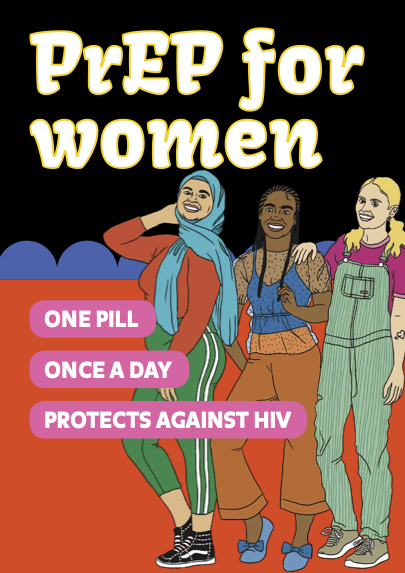In the realm of HIV prevention, pre-exposure prophylaxis (PrEP) offers significant hope by substantially reducing the risk of HIV infection. PrEP can be taken daily as a pill, such as the brand names Truvada and Descovy, or as an injection, Apretude, administered every two months. Generic versions of Truvada and Descovy, known as Emtricitabine/tenofovir (TDF/FTC) & Tenofovir alafenamide/emtricitabine (TAF/FTC), are also available and approved for use. The Centers for Disease Control (CDC) has approved Truvada and Apretude for use by women and individuals engaging in receptive vaginal sex. Likewise, TAF/FTC is suggested for transwomen and individuals engaging in anal sex (CDC).

(Source Link, accessed 8/4/2024)
PrEP is 99% effective when taken consistently, making it a game-changer for those at risk of contracting HIV (HIV.gov). Sadly, this ground-breaking HIV medication is under-utilized in high-risk populations, especially among those experiencing houselessness. Unhoused women have limited access to accurate information about HIV/AIDS and are disproportionately impacted by low PrEP usage (Wenzel et al., 2017). According to the CDC, only 15% of women who could benefit from PrEP have access. Unfortunately, there is insufficient data on how many unhoused women use or even have access to PrEP.
PrEP and Houselessness -What can be done?
People experiencing houselessness face an increased risk of contracting HIV compared to those with stable housing. In 2022, the CDC found that 17% of people living with HIV experienced houselessness in the past year. Additionally, a report from the U.S. Department of Housing and Urban Development (HUD) in 2022 revealed that, among 623,104 people experiencing houselessness, 38% were women.
Unstable housing often intersects with other factors, such as race, gender identity, sexual orientation, financial instability, and mental health, complicating PrEP access and utilization. People of color and LGBTQ+ individuals, specifically those with trans and non-binary experience, face higher rates of houselessness, which can hinder their ability to obtain and use PrEP effectively (Williams Institute). Unhoused folks are also more likely to belong to a racial/ethnic minority group.
Community health workers can bridge the gap and improve access to PrEP for women and other individuals with housing instability by engaging them directly in places such as houseless shelters and through street-based outreach. For further resources and support, please refer to the section below.
Call to Action/Resources
- Support programs/organizations like the Ohio HIV Drug Assistance Program (OHDAP), dedicated to improving PrEP access for unhoused individuals
- Create and fund mechanisms for unhoused women to have access to care regarding PrEP.
- Advocate for policy changes.
- Donate to organizations such as the AIDS Funding Collaborative that cater to unhoused women and gender-diverse folk
- Find a PrEP-friendly provider such as Equitas Health or other HIV and LGBTQ+ clinics that provide PrEP.


